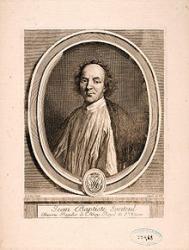- |
User Links
O Christ, who hast prepared a place

O Christ, who hast prepared a place
Author: J. B. de Santeüil; Translator: John ChandlerPublished in 19 hymnals
Printable scores: PDF, MusicXMLAudio files: MIDI
Representative Text
1. O Christ, who hast prepared a place
For us around Thy throne of grace,
We pray Thee, lift our hearts above,
And draw them with the cords of love.
2. Source of all good, Thou, gracious Lord,
Art our exceeding great reward;
How transient is our present pain,
How boundless our eternal gain!
3. With open face and joyful heart,
We then shall see Thee as Thou art:
Our love shall never cease to glow,
Our praise shall never cease to flow.
4. Thy never-failing grace to prove,
A surety of Thine endless love,
Send down Thy Holy Ghost, to be
The raiser of our souls to Thee.
Source: The Cyber Hymnal #4767
Author: J. B. de Santeüil
 Santeüil, Jean-Baptiste de, was born in Paris of a good family on May 12, 1630. He was one of the regular Canons of St. Victor, at Paris, and, under the name of Santolius Victorinus, was distinguished as a writer of Latin poetry. Many of his hymns appeared in the Cluniac Breviary 1686, and the Paris Breviaries 1680 and 1736, and several have been translated into English, and are in common use in Great Britain and America. He was very jocose in disposition and singular in his habits. When on a journey he died at Dijon, Aug. 5, 1697. His Hymni Sacri et Novi were published at Paris in 1689, and again, enlarged, in 1698. [George Arthur Crawford, M.A.]
--John Julian, Dictionary of Hymnology (1907)
Go to person page >
Santeüil, Jean-Baptiste de, was born in Paris of a good family on May 12, 1630. He was one of the regular Canons of St. Victor, at Paris, and, under the name of Santolius Victorinus, was distinguished as a writer of Latin poetry. Many of his hymns appeared in the Cluniac Breviary 1686, and the Paris Breviaries 1680 and 1736, and several have been translated into English, and are in common use in Great Britain and America. He was very jocose in disposition and singular in his habits. When on a journey he died at Dijon, Aug. 5, 1697. His Hymni Sacri et Novi were published at Paris in 1689, and again, enlarged, in 1698. [George Arthur Crawford, M.A.]
--John Julian, Dictionary of Hymnology (1907)
Go to person page >Translator: John Chandler
John Chandler, one of the most successful translators of hymns, was born at Witley in Surrey, June 16, 1806. He was educated at Corpus Christi College, Oxford, B.A. 1827, M.A. 1830. Ordained deacon in 1831 and priest in 1832, he succeeded his father as the patron and vicar of Whitley, in 1837. His first volume, entitled The Hymns of the Primitive Church, now first Collected, Translated and Arranged, 1837, contained 100 hymns, for the most part ancient, with a few additions from the Paris Breviary of 1736. Four years later, he republished this volume under the title of hymns of the Church, mostly primitive, collected, translated and arranged for public use, 1841. Other publications include a Life of William of Wykeham, 1842, and Horae s… Go to person page >Text Information
| First Line: | O Christ, who hast prepared a place |
| Original Language: | Latin |
| Translator: | John Chandler |
| Author: | J. B. de Santeüil |
| Language: | English |
| Copyright: | Public Domain |
Notes
Nobis, Olympo redditus. Jean Baptiste de Santeüil. [Ascension.] This hymn appeared in the Cluniac Breviary, 1686, p. 503, as "Nostras, Olympo redditus." It was repeated in Santeüil's Hymni Sacri et Novi, 1689, p. 24 (edition 1698, p. 106), in 5 stanzas of 4 lines. In the Paris Breviary, 1736, stanza ii. is omitted, and another was added as the concluding stanza, beginning, ”Venture Judex saeculi." The 1736 text is in J. Chandler's Hymns of the Primitive Church, 1837, and Card. Newman's Hymni Ecclesiae, 1838 and 1865. Translated as:—
1. 0 Christ, Who hast prepared a place. By J. Chandler, from the Paris Breviary text, in his Hymns of the Primitive Church, 1837, p. 86. It was soon introduced into the hymn-books, sometimes with slight alterations, as in Murray's Hymnal, 1852; and at other times with the omission of stanza v., as in Mercer, Oxford edition, 1864, and others. In Hymns Ancient & Modern, 1861, it reads: "O Christ, Who dost prepare a place," but it is omitted from the revised edition, 1875. This translation in various forms is in extensive use. In Martineau's Hymns, 1873, 3 stanzas are given as "The Crucified is gone before."
--Excerpts from John Julian, Dictionary of Hymnology (1907)


 My Starred Hymns
My Starred Hymns

